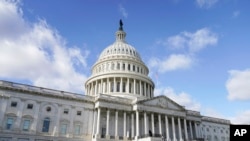Democratic and Republican leaders in the U.S. Congress Sunday unveiled a short-term spending bill that would avert a partial government shutdown and keep federal agencies operating into March.
The agreement aims to avert short-term chaos and buy more time to craft the complex spending legislation that funds government activity.
Government agencies that oversee transportation, housing, and other services are due to run out of funding by midnight on Friday and would have to scale back activity if new funding is not signed into law.
The Democratic-led Senate and Republican-controlled House of Representatives have been at odds over spending levels for months.
Senate Democratic Leader Chuck Schumer agreed on the measure with Republican House Speaker Mike Johnson, Senate Republican leader Mitch McConnell and House Democratic leader Hakeem Jeffries.
The legislation could run into difficulty in the House, where a faction of conservative Republicans have used disruptive tactics to press for lower spending levels.
Republicans control the chamber with a narrow 219-213 majority, leaving Johnson with little room for error. Some Republicans insist that any spending bills must also clamp down on the U.S.-Mexico border.
Current funding is due to expire this week for federal programs involving transportation, housing, agriculture, energy, veterans and military construction.
Funding for other parts of the government, including defense, will continue through Feb. 2.
The new spending bill would extend the deadline to March 1 for the first group and March 8 for the second. Schumer, the top Democrat in Congress, and Johnson, the top Republican, have agreed on a $1.59 trillion total for those bills.
That would give lawmakers more time to negotiate and pass the detailed spending legislation they should have passed before the start of the government's fiscal year on Oct. 1, 2023.
The legislation covers roughly one-third of U.S. government spending, which amounted to $6.1 trillion in the last fiscal year.
The remaining two-thirds includes retirement and health benefits which do not need to be approved annually by Congress, as well as interest payments.
Johnson spent much of last week in meetings with hardliners and other segments of his Republican conference, raising speculation that he could seek to revise his agreement with Schumer. But the speaker ultimately stood by the deal.
The federal government came close to a partial shutdown last autumn, when hardline Republicans ousted former Speaker Kevin McCarthy for reaching a bipartisan stopgap spending deal with Schumer.





